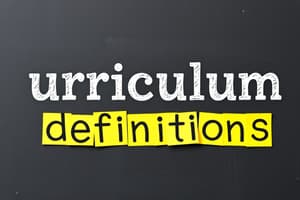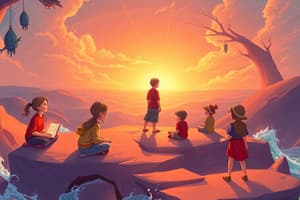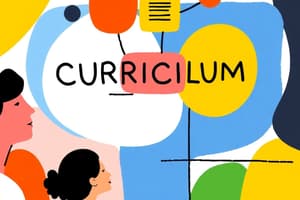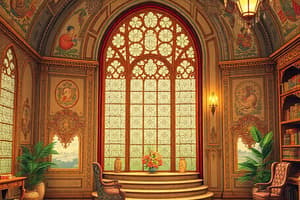Podcast
Questions and Answers
What is referred to as the quizzes, tests, and other methods used to measure students' success?
What is referred to as the quizzes, tests, and other methods used to measure students' success?
- Ideal Curriculum
- Assessed Curriculum (correct)
- Societal Curriculum
- Concomitant Curriculum
Which curriculum includes family experiences, values, and morals sanctioned by the family?
Which curriculum includes family experiences, values, and morals sanctioned by the family?
- Formal Curriculum
- Societal Curriculum
- Concomitant Curriculum (correct)
- Implemented Curriculum
What philosophical system is characterized by the principle of 'learning by doing'?
What philosophical system is characterized by the principle of 'learning by doing'?
- Idealism
- Existentialism
- Realism
- Pragmatism (correct)
What was the fundamental idea of Idealism according to Plato?
What was the fundamental idea of Idealism according to Plato?
According to Aristotle's Realism, where is reality based?
According to Aristotle's Realism, where is reality based?
Who emphasized that curriculum subject matter should revolve around the interests of learners?
Who emphasized that curriculum subject matter should revolve around the interests of learners?
In the bilingual education scheme established in 1974, which languages were mandated in schools?
In the bilingual education scheme established in 1974, which languages were mandated in schools?
What year saw the change from the Department of Instruction to the Department of Education?
What year saw the change from the Department of Instruction to the Department of Education?
Who characterized 'curriculum' as fragmentary, elusive, and confusing?
Who characterized 'curriculum' as fragmentary, elusive, and confusing?
What type of curriculum emphasizes mastery of subject matter and relies on organized context and standards?
What type of curriculum emphasizes mastery of subject matter and relies on organized context and standards?
According to Arthur Bestor, what should the mission of the school emphasize?
According to Arthur Bestor, what should the mission of the school emphasize?
What does the Humanistic Conception of curriculum primarily focus on?
What does the Humanistic Conception of curriculum primarily focus on?
What is the focus of the Social Reconstructionist Conception in education?
What is the focus of the Social Reconstructionist Conception in education?
Which curriculum conception is characterized by aligning ideas from two or more curriculum conceptions?
Which curriculum conception is characterized by aligning ideas from two or more curriculum conceptions?
What is referred to as the 'taught curriculum'?
What is referred to as the 'taught curriculum'?
What type of curriculum is rooted in the study of social problems and emphasizes human relations?
What type of curriculum is rooted in the study of social problems and emphasizes human relations?
Which psychological foundation of the curriculum emphasizes learning through interactions with one's environment?
Which psychological foundation of the curriculum emphasizes learning through interactions with one's environment?
What best describes the process of learning according to Behaviorism?
What best describes the process of learning according to Behaviorism?
Which learning theory is characterized by the use of rewards and punishments?
Which learning theory is characterized by the use of rewards and punishments?
According to Gagné, how many domains are used to classify learning outcomes?
According to Gagné, how many domains are used to classify learning outcomes?
What is the domain of 'valuing' as defined by Krathwohl?
What is the domain of 'valuing' as defined by Krathwohl?
According to Worthen and Sanders, what aspect do they emphasize as vital in curriculum design?
According to Worthen and Sanders, what aspect do they emphasize as vital in curriculum design?
What definition of curriculum was provided by Caswell and Campbell?
What definition of curriculum was provided by Caswell and Campbell?
What is meant by 'Curricula as a Set of Objectives'?
What is meant by 'Curricula as a Set of Objectives'?
In what year was the institute governing basic education renamed as the Department of Education (DepEd)?
In what year was the institute governing basic education renamed as the Department of Education (DepEd)?
What do Kto12 graduates expected to be equipped with?
What do Kto12 graduates expected to be equipped with?
Which act abolished the Bureau of Higher Education?
Which act abolished the Bureau of Higher Education?
What was the main aim of education during the Japanese-Devised Curriculum (1941-1944)?
What was the main aim of education during the Japanese-Devised Curriculum (1941-1944)?
What was the focus of The Education Act of 1982?
What was the focus of The Education Act of 1982?
During which period did the Philippine Curriculum emphasize democracy and westernization?
During which period did the Philippine Curriculum emphasize democracy and westernization?
Who oversees public and private higher education institutions as mandated by Republic Act No. 7722?
Who oversees public and private higher education institutions as mandated by Republic Act No. 7722?
What was issued by President Ferdinand E. Marcos to influence the Philippine Curriculum?
What was issued by President Ferdinand E. Marcos to influence the Philippine Curriculum?
Flashcards are hidden until you start studying
Study Notes
Curriculum Definition and Origins
- Curriculum is considered to be the totality of learning experiences for individuals.
- "Curriculum" originates from the Latin word "currere," meaning "to run."
- According to Robert M. Hutchins, the curriculum is fragmentary, elusive, and confusing.
- Arthur Bestor believes that the curriculum's mission should focus on strengthening intellectual training.
- John Dewey emphasizes the importance of a curriculum that encompasses all of an individual's learning experiences.
Curriculum Conceptions
- Academic Rationalist Conception: Emphasis on different bodies of knowledge as the core of curriculum.
- Cognitive Processes Conception: Focuses on developing cognitive skills applicable to intellectual problem-solving.
- Humanistic Conception: Aims to foster the complete development of individuals' potential.
- Social Reconstructionist Conception: Views the school as an agent of societal change.
- Technological Conception: Emphasizes adapting to societal needs and issues.
- Eclectic Conception: Integrates concepts from multiple curriculum conceptions.
Curriculum Types
- Subject-Centered Curriculum: Emphasizes mastery of subject matter through structured content and standards.
- Experience/Learner-Centered Curriculum: Centers on learners' interests, integrated content, and problem-solving skills.
- Society/Culture-Based Curriculum: Focuses on social issues, problem-solving, and human relationships.
Curriculum Categories
- Written Curriculum: Formally documented and written educational plans.
- Taught Curriculum: How teachers actually implement the curriculum, which may vary across institutions.
- Supported Curriculum: Resources like textbooks, computers, and other aids used to facilitate teaching and learning.
- Assessed Curriculum: Methods used to evaluate student learning (e.g., quizzes, tests).
- Concomitant Curriculum: Learning experiences outside of formal education, including family values and morals.
- Societal Curriculum: The extensive informal education system encompassing various socializing forces.
Philosophical Foundations of Curriculum
- Idealism (Plato): Emphasizes the importance of mind and spirit, aiming to develop these aspects within the learner.
- Realism (Aristotle): Belief that reality is based on verifiable facts and truths.
- Pragmatism (W. James, Dewey, Rousseau): "Learning by doing" is a central principle.
- Existentialism (Kierkegaard, Marcel, Sartre): Focuses on the individual's quest for meaning in life and emphasizes self-awareness.
Curriculum Development: Historical Perspective
- Spanish Government Period (1521-1869): Compulsory education emphasized Christianity, the Spanish language, and Spanish culture.
- American Government Period (1898-1935): The curriculum promoted democracy, separation of church and state, and Westernization.
- Commonwealth Period (1935-1946): English served as the primary language of instruction. Filipino teachers played a key role in curriculum development.
- Japanese-Devised Curriculum (1941-1944): Aimed to eliminate American influence.
- Philippine Republic (1946-Present): Emphasizes cultural appreciation, heritage preservation, character development, bilingualism, and specialization.
- Educational Development Decree of 1972: A significant marker in the evolution of Philippine curriculum, issued by President Ferdinand E. Marcos.
Psychological Foundations of Curriculum
- Connectionism (Edward Thorndike): Learning through associations between stimuli and responses.
- Behaviorism in Education: Learning occurs through interactions with the environment.
- Operant Conditioning: Employing rewards and punishments to influence behavior.
- Gagné's Learning Outcomes: Classified into three domains, with five categories of learning: intellectual skills, cognitive strategy, verbal information, motor skills, and attitude.
- Theory of Social Constructivism: Learning is a collaborative process through social interactions and the guidance of others.
- Goleman's EQ Theory: Comprises five core components related to emotional intelligence.
Curriculum Components and Practices
- Educational Objectives: Specific goals for each learner.
- Domains of Learning (Krathwohl):
- Cognitive Domain: Knowledge, understanding, application, analysis, synthesis, and evaluation.
- Affective Domain: Receiving, responding, valuing, organizing, and characterizing.
- Psychomotor Domain (Simpson): Perception, set, guided response, mechanism, complex overt response, adaptation, and origination.
- Curriculum Specialists' View of Content: Accumulated discoveries and inventions.
- Communication Arts: Covers listening, speaking, reading, writing, and language use.
- Teaching Methods: Aim to develop cognitive, affective, psychomotor, social, and spiritual domains.
- Curriculum Evaluation (Worthen and Sanders, 1987): Emphasis on evaluation to ensure alignment with goals and intended outcomes.
- Discipline in Curriculum (Joseph Schwab): Discipline as the primary source of curriculum content.
- Curriculum as Experiences (Caswell and Campbell): All experiences contribute to learning.
- Teachers' Role in Curriculum Planning (Marsh and Willis): Teachers are responsible for planning and enacting classroom learning experiences.
- Curricula as Sets of Objectives: Focusing on establishing specific educational goals and objectives.
Studying That Suits You
Use AI to generate personalized quizzes and flashcards to suit your learning preferences.




